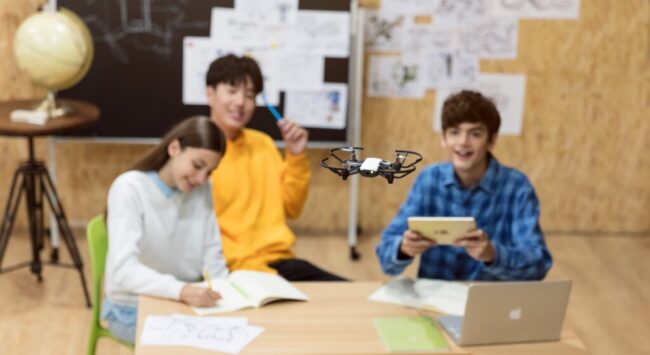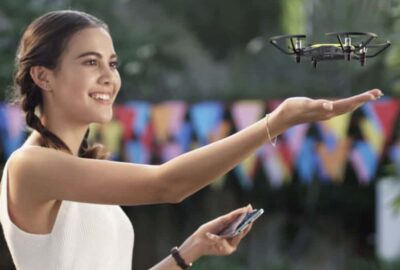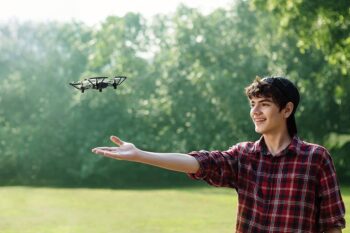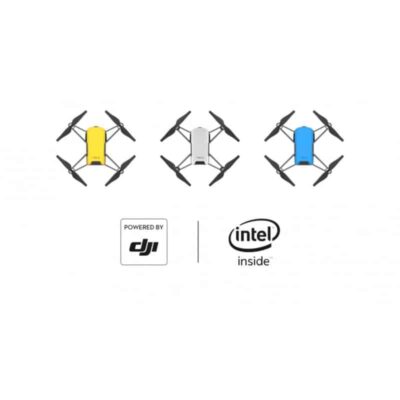Robotics and Drones Course
Welcome to the exciting world of Robotics and Drones at the Adelaide Robotics and Computer Science Academy (ARCSA)! In our groundbreaking new course, we blend the intricacies of robotics with the dynamic field of programmable drone technology, offering students a unique opportunity to dive into two of the most cutting-edge areas in modern technology. The Robotics and Drones Course is designed for those passionate about exploring the realms of programmable machines, both on the ground and in the air.
This comprehensive program combines the best of both worlds: the well-established Robotics Course based on the Carnegie Mellon University Curriculum and the innovative Drones Syllabus. By integrating these two curriculums, we provide students with a holistic learning experience that encompasses the fundamentals of robotics and programming and extends to the exciting applications of drones in various industries.
Our course is structured to guide students through the complexities of building, programming, and controlling robots while expanding their horizons in the world of programmable drones. They will delve into the history of robots, understand their classification, and explore their growing role in modern society. The curriculum also includes rigorous training in Computational Thinking, problem-solving, and real-world project-based learning.
In the Drones segment, students will discover the thrill of programming Tello drones and learning through interactive experiences that combine Mathematics, Physics, and Computer Vision. This innovative approach enables them to see theoretical concepts come to life as drones fly and respond to their programming skills.
As students progress, they will face challenges that mimic real-life scenarios, such as crisis management simulations, Mars exploration, and urban planning projects. These exercises foster innovation, adaptability, and teamwork, preparing students for a future where robotics and drone technology play a pivotal role across various industries.
Upon course completion, students can take an optional exam, and successful candidates receive a certificate from Carnegie Mellon University. This course is not just a learning journey but a gateway to future career opportunities in numerous fields where robotics and drone technology are revolutionizing how we work and live.
Each year, we organise excursions to places of significant technological and scientific interest to broaden our students’ understanding and inspire them in their educational journeys. In the past, we have visited esteemed institutions such as Tonsley Innovation District, Flinders University, BAE Systems, Line Zero (Factory of the Future), Royal Adelaide Hospital, Hamilton Space School, Fleet Space Technologies, Defence Science and Technology Group (DSTG). These visits have been immensely beneficial in providing our students with real-world insights and practical experiences that complement their academic pursuits. The experiences enhanced their theoretical knowledge and provided valuable career insights for our older students who are contemplating their future professional paths.
Join us at ARCSA for the Robotics and Drones Course, where we pave the path for the innovators and problem-solvers of tomorrow. Let’s embark on this exciting adventure together!
Robotics Course
In the Robotics Course, students learn to program following a curriculum designed by Carnegie Mellon University. The syllabus includes challenges, activities, videos, resources, documentation, materials, competitions, and tools for Robotics. The course provides a structured sequence of building and programming activities in real-world project-based contexts. There are 100+ projects designed to get students thinking more generally about the patterns and structure of robotics and problem-solving. The course is based on the principles of Computational Thinking. On completion, students may take an optional 70-question exam, and if successful, they are awarded a Certificate from Carnegie Mellon University.
Curriculum
Introduction to Robotics
- Robots definition by genus and difference
- History of robots
- Robots in modern society
- Robots classification
- Robotics in Education
- How robots think
- Various Robotics competitions
Movement Module
- Introduction to Computational Thinking
- Sensabot Challenge (forward, backwards, moving arms)
- Orchard Challenge (study various types of turns)
Sensors Module
- Touch Sensor Challenge (Loader Challenge)
- Ultrasonic sensor (Maze Challenge)
- Gyroscopic Sensor (Mower Challenge)
- Colour and Light Sensor (Traffic Light Challenge)
Decisions Module
- Loops (Container Handling Challenge)
- If/Else Statements (Strawberry Plant Sorter)
- Complex Functions (Obstacle Orchard)
- Line Tracking Challenge
Gyroscope Investigation Module
- Data Logging and Interpretation
- Using graphs, calculations, analysis
Mathematics & Logic Module
- Variables
- Logic Operators
- Mathematics
- Random, rounding, comparing, ranging
Final Challenge
Introduces the student to concepts such as flowcharts, iterative design, project planning and the engineering process. At the end of the module, the student needs to solve the “Search and Rescue” challenge, where the robot will have to visit four different rooms and solve specific problems).
Programmable Drones Course
Why not explore the world of programmable drones? We are all familiar with the fun of flying drones, but did you know that some of them can be programmed? The world’s largest drone manufacturer, DJI, believes that play and learning go hand in hand, and they have created their educational drone, Tello, with this in mind. Tello is an easy-to-use drone powered by a DJI flight control system (IMU) and an Intel processor, combining cutting-edge technology with entertainment. And the best part? Like many other robots, you can program this flying mini-computer using Python, JavaScript, Node-RED or DroneBlocks.

Programming Tello offers a unique and interactive way to teach students Mathematics (Geometry and Trigonometry) and Physics. Instead of simply staring at formulas on a whiteboard, students can learn faster by watching the drone fly. We also incorporate Computer Vision into the curriculum, allowing students to program drones to recognise and understand shapes (such as people, body parts, faces, and obstacles), motion (gestures), colours, and ArUco markers.

The most thrilling aspect of the course is implementing real-life applications. Students can program robots and drones to work together and solve complex challenges through various scenarios that demand innovation, adaptability, and teamwork. For example, they can work as part of a multidisciplinary team in a simulated Crisis Management Center to tackle floods and bushfires. They can also learn Project Management by simulating missions such as Mars exploration or supply delivery in remote areas. Another application is the war room strategy game, which requires students to plan and launch complex campaigns.

Programming drones prepares students for a wide range of future careers. Drones are becoming increasingly important in industries such as the film industry, electricity, urban planning, oil and gas, aerial surveying, real estate, architecture-engineering-construction (AEC), natural resource management, agriculture, public safety (law enforcement, firefighting, rescue) and more. By learning to program drones, students can gain valuable skills that will take them far in their careers. Check the above links to see where can knowledge take you!

Curriculum:
- Flight safety
- Physics: fluid dynamics (aerodynamic force lift, airfoil, other forces, vectors)
- Engineering: quadcopter axes and motions
- Basics of autonomous flight
- Flight Training: throttle, pitch, roll, yaw
- Loops and recursion
- Logic: if/else statements, boolean (true/false)
- Variables and Functions
- Algebra
- 3D cartesian coordinates (mapping the quadrants)
- Geometry (arcs, circles, helix, spiral, polygon equation, Pythagorean theorem)
- Trigonometry (sine, cosine, tangent, cotangent)
- Programming with Python
Conquering the Future, Charting Unseen Seas! Join us today!
